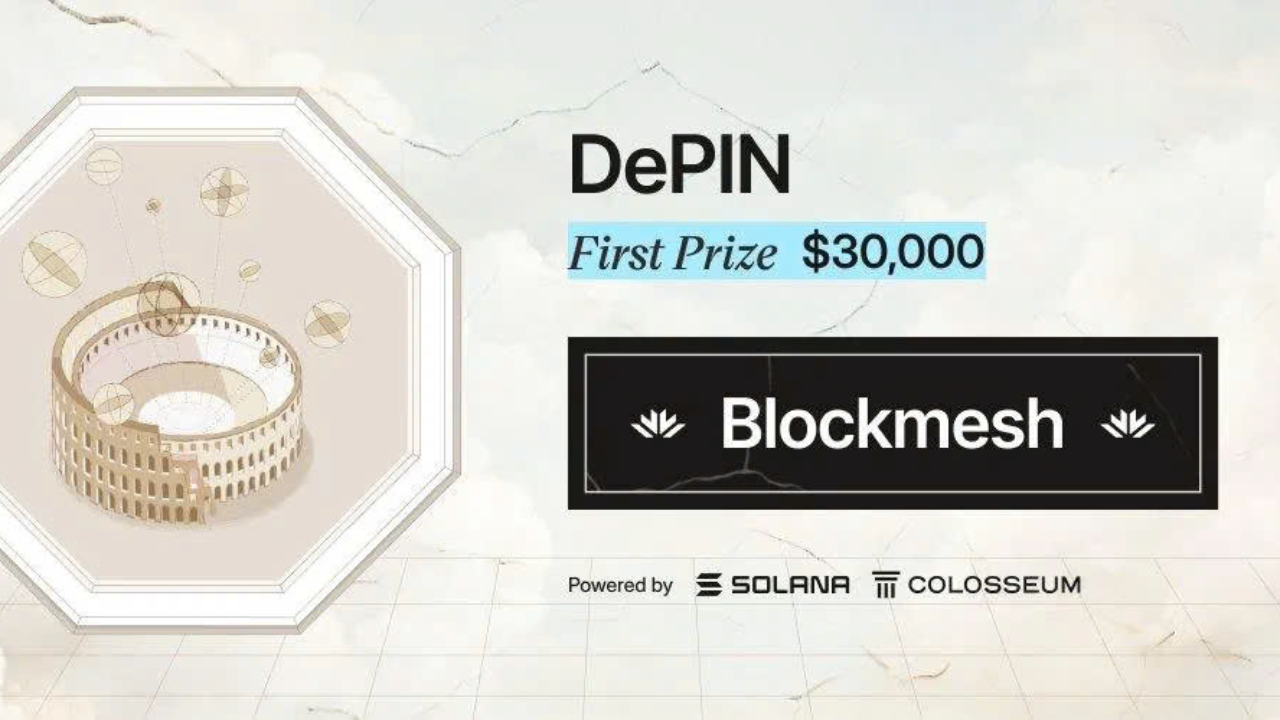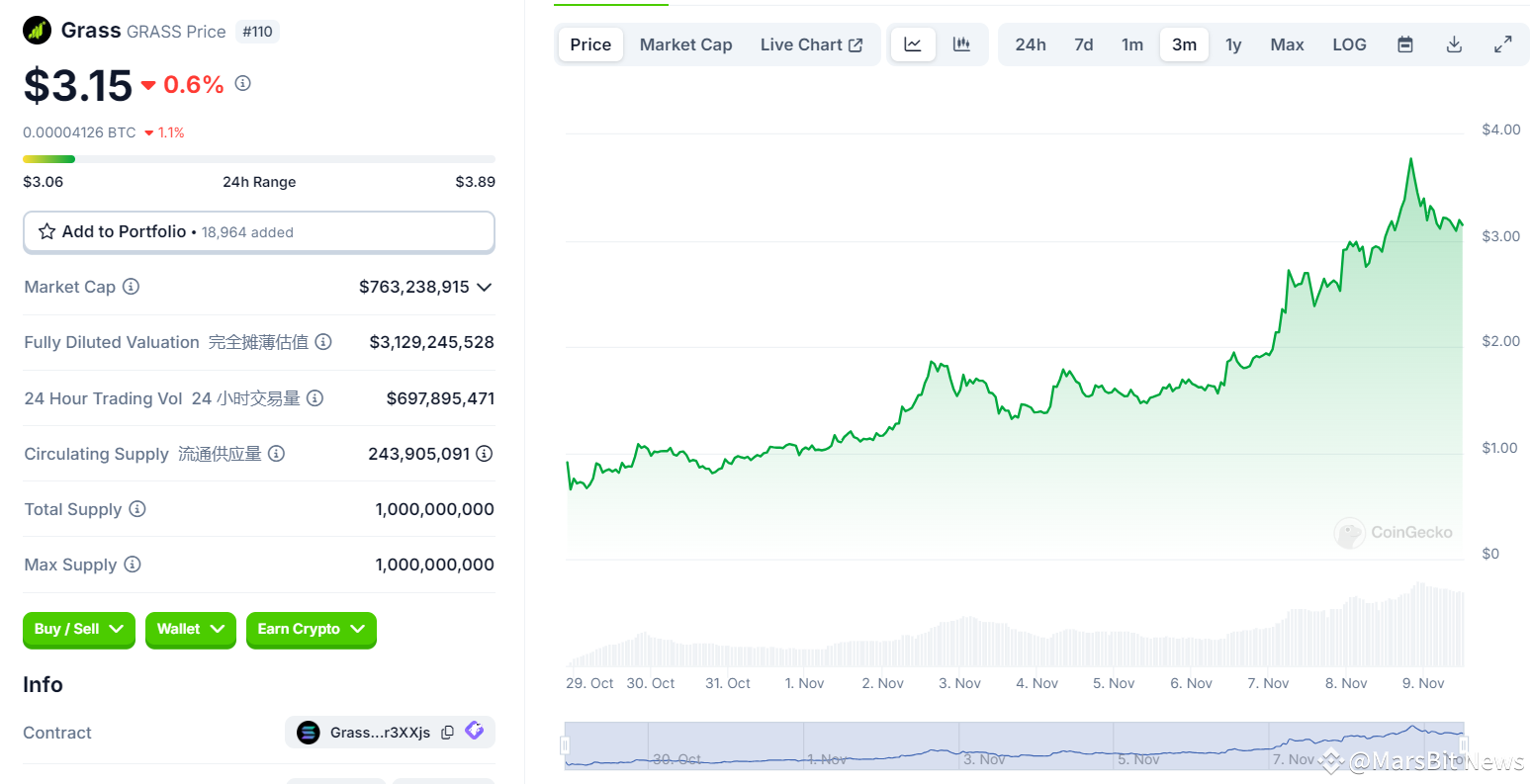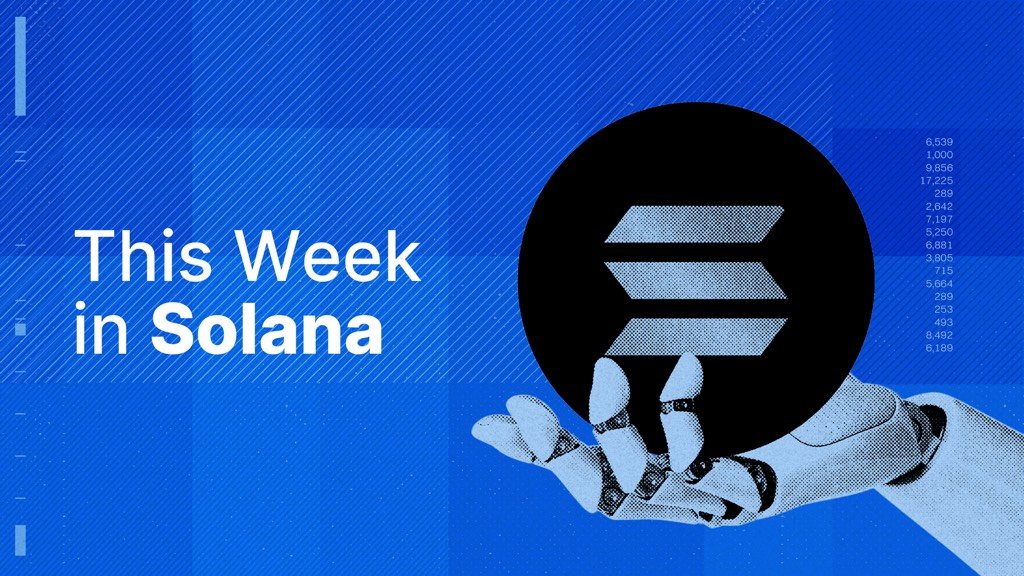Latest DePIN Token Launch News
View Token Launch Projects
a year ago
Kraken to Launch Aethir Token (ATH) and Meme Coin Apu Apustaja (APU) on November 12
Kraken, one of the leading cryptocurrency exchanges, is set to launch two new tokens on November 12, 2024, at 14:00 UTC: the Aethir native token (ATH) and the meme coin Apu Apustaja (APU). This announcement has generated significant excitement within the crypto community, particularly as Kraken prepares to add 17 new listings, including several meme coins. The Aethir token, which has recently seen a price increase of 17.14% in the past 24 hours, is currently trading at $0.07, reflecting a 12.29% rise since Kraken's announcement of its listing.
The Aethir token, launched earlier this year on June 12, 2024, plays a crucial role in the Aethir DePIN stack, facilitating payments for GPU resources in AI and cloud gaming. With a market cap exceeding $280 million, Aethir aims to democratize access to GPU resources through its decentralized cloud infrastructure. In contrast, the Apu Apustaja meme coin, which started as an internet meme, has seen a slight decline of 3% in the past 24 hours, trading at $0.000982. Despite this, APU maintains a market cap of $326 million and a robust community following.
The upcoming launch of ATH and APU on Kraken is a significant event for both tokens, as it provides them with increased visibility and trading opportunities. The Aethir token's recent performance, particularly its 54.41% increase over the past week, suggests that it may benefit from the ongoing Bitcoin rally, which has reached an all-time high of $89,604. As the crypto market continues to evolve, the success of these tokens will depend on their adoption and the overall market sentiment surrounding cryptocurrencies.

a year ago
YOM Partners with K4 Rally to Revolutionize Blockchain Gaming
YOM has announced an exciting partnership with K4 Rally to introduce blockchain rally racing gaming to its decentralized network. This collaboration aims to pioneer cloud gaming by utilizing a decentralized physical infrastructure network (DePIN) that allows AAA quality games, such as K4 Rally, to be streamed to any device. By leveraging URL hosting and popular platforms like Telegram, players can enjoy a diverse range of traditional and blockchain-based gaming experiences without the need for high-end gaming hardware.
K4 Rally stands out as a groundbreaking blockchain-powered rally racing game that offers players a unique play-to-earn experience. Players can own in-game assets and cars as NFTs while competing in various racing tournaments globally. This game is designed to bridge the gap between traditional gaming and blockchain technology, ensuring genuine ownership of assets and a transparent, decentralized gaming ecosystem. The integration of K4 Rally’s NFT-based asset system with YOM’s decentralized pixel-streaming network aims to enhance accessibility, allowing players to access the game directly through their web browsers.
The partnership also focuses on joint research and development efforts to improve cloud gaming accessibility through browser-based URL access. By utilizing YOM’s decentralized edge infrastructure, K4 Rally can provide players with minimal latency and uninterrupted gameplay, regardless of their location or hardware capabilities. Both companies plan to enhance user engagement and expand their player base through cross-promotion, revolutionizing the gaming experience for both traditional and blockchain gamers. This collaboration is set to break new ground in the gaming industry, offering innovative technology and decentralized solutions for an exceptional gaming experience.

a year ago
Exploring Blockmesh: A New Opportunity in DePIN and Airdrop Participation
Blockmesh, a decentralized physical infrastructure network (DePIN) project, has gained significant attention after winning the Solana Renaissance Hackathon. This innovative project leverages AI technology to create a decentralized monitoring model that enables users to monetize their idle bandwidth and computing resources. By doing so, Blockmesh allows individuals to generate passive income from their unused resources, while also ensuring that AI activities are closely monitored to mitigate risks such as misinformation and privacy invasion. The project is reminiscent of other successful models like Grass, Dawn, Nodepay, and Gradient, and it has already attracted over 60,000 participants eager to engage in its airdrop program.
Currently, Blockmesh has launched a Node program that allows users to accumulate points, which will later be converted into airdrops. To participate in this airdrop, users must follow a straightforward process that includes registering for a Blockmesh account, downloading the Blockmesh Network app from the Chrome store, and connecting their Solana wallet and Twitter account to boost their points. The project emphasizes that users should operate under the principle of one device, one Wi-Fi connection, and one account to ensure compliance with its guidelines. However, it is important to note that the development team, investment fund, and tokenomics details have yet to be announced, leaving some uncertainty about the project's future.
In summary, Blockmesh presents a unique opportunity for users to engage with a cutting-edge DePIN project while earning potential rewards through its airdrop program. As the project evolves, participants are encouraged to stay informed about updates and developments. The insights provided in this article aim to equip readers with the necessary knowledge to effectively navigate the airdrop opportunity and maximize their involvement in the Blockmesh ecosystem. By following the outlined steps, users can position themselves to benefit from this promising initiative in the rapidly growing blockchain landscape.

a year ago
GRASS Perpetual Contracts Launch Sparks Market Surge
Last night, Binance made headlines with the launch of GRASS perpetual contracts, which significantly boosted market sentiment. The price of GRASS surged to an impressive $3.5, marking a new record high, while trading volume exceeded $700 million within 24 hours. Since its inception on October 29, GRASS has experienced a staggering growth of over 400%. This meteoric rise has sparked interest in the underlying fundamentals of the coin, particularly its innovative approach to data monetization within the DePIN (Decentralized Physical Infrastructure Networks) framework. Supported by major venture capital firms like Polychain and Deiphi, GRASS is positioned as a frontrunner in the data economy, offering rewards for data contributions and challenging the traditional monopolistic data models.
The technical analysis of GRASS reveals a strong buying momentum, with the Relative Strength Index (RSI) climbing to 71.8, indicating an overbought condition. This rapid increase in price has attracted significant market attention, but it also raises concerns about potential pullbacks. The Ichimoku cloud chart suggests that GRASS is currently riding high, with key support levels around $2.9 and $2.4, which could cushion any necessary corrections. As the cryptocurrency market continues to evolve, the stability of GRASS's staking numbers—remaining above 26.6 million—demonstrates investor confidence in its long-term potential, despite the risks of profit-taking in a volatile environment.
Looking ahead, the DePIN sector is poised for substantial growth, with predictions estimating its market value could reach $3.5 trillion by 2028. This projection highlights the increasing demand for decentralized data solutions, particularly as AI technology continues to advance. GRASS stands out as a promising investment within this burgeoning landscape, appealing to those seeking to capitalize on the data revolution. However, investors must remain vigilant, balancing the excitement of rapid gains against the inherent risks of market fluctuations. The future of GRASS and the DePIN track may well depend on broader market trends and the ongoing evolution of data decentralization strategies.

a year ago
Helium's HNT Token Shows Strong Bullish Momentum with Potential for New Highs
As the cryptocurrency market shows signs of recovery, Helium's HNT token is experiencing a significant bullish resurgence. The price has made a swift V-shaped reversal, recently crossing above the $6.50 mark. This upward movement has resulted in a weekly surge of approximately 20%, positioning Helium for a potential breakout rally that could lead to a new 52-week high. Market analysts are now questioning whether this uptrend will push HNT above the psychological $10 threshold, which would mark a significant milestone for the token.
In analyzing HNT's price action, the daily chart reveals a bullish comeback from the 50% Fibonacci level, coinciding with the 200-day Simple Moving Average (SMA). This reversal is characterized by a bounce from the $5.52 support level, which has allowed the price to exceed the 61.80% Fibonacci level at $6.365. Currently, HNT is trading at $6.66, reflecting an intraday increase of 7.36%. The formation of four out of five bullish candles indicates a strong recovery, although the price has yet to break the lower-high formation trend. A successful jump above the $7.78 mark, or the 78.60% Fibonacci level, could signal a significant shift in the price trend, enhancing the likelihood of reaching a new 52-week high.
Looking ahead, the technical indicators suggest a bullish outlook for Helium. The consolidation between the 50-day and 200-day SMA lines indicates that a breakout above the upper resistance could amplify the trend momentum. Additionally, the MACD is nearing a bullish crossover due to increased buying pressure. If the bullish trend persists, price targets based on Fibonacci retracement levels are set at $10.05, with further potential highs of $13.91 and $21. Conversely, critical support levels are identified at $6.36 and the psychological $6 mark, which will be essential for maintaining upward momentum in the coming months.

a year ago
Top Trending Cryptos: Drift, Notcoin, and Grass Make Waves
In the ever-evolving landscape of cryptocurrencies, today's top trending altcoins include Drift (DRIFT), Notcoin (NOT), and Grass (GRASS). Drift, the governance token of the Solana-based decentralized exchange Drift Protocol, is gaining traction following its recent listing on the South Korean exchange Upbit. The listing, which pairs DRIFT with Bitcoin (BTC), USDT, and the Korean Won (KRW), has led to a staggering 500% surge in trading volume and an 88% increase in price, currently sitting at $0.95. However, technical indicators suggest that DRIFT may be overbought, with a Relative Strength Index (RSI) reading of 77.05, indicating potential for a price retracement to $0.70 unless buying pressure continues to push it higher.
On the other hand, Notcoin (NOT) has not fared as well, experiencing a 16.69% decline in the last 24 hours, bringing its price down to $0.0063. Despite this downturn, Notcoin has formed a falling wedge pattern on the daily chart, which is typically a bullish reversal signal. If the price can hold above $0.0060, there is potential for a rebound towards $0.013. However, a drop below this level could see it fall further to $0.0056, indicating a precarious position for investors.
Grass (GRASS) continues to impress, having appeared on the trending list consistently over the past week. The token, associated with the Decentralized Physical Infrastructure Network (DePIN) project, has surged by 31.81% in the last 24 hours, making it one of the top performers among the top 100 cryptocurrencies. With a positive Moving Average Convergence Divergence (MACD) reading, there is optimism that GRASS could climb above $3.33. However, profit-taking by holders could lead to a decline below $2.50, highlighting the volatility inherent in the crypto market.

a year ago
Rollblock ($RBLK) Emerges as a Promising Investment Amid Crypto Volatility
The cryptocurrency market has recently experienced significant volatility, particularly with assets like Pepe and Bittensor showing dramatic price fluctuations. Investors are increasingly turning their attention to Rollblock ($RBLK), a Web3 casino platform that promises more stable and bullish price action. With the potential for remarkable gains, many believe that Rollblock could achieve 100x returns in this market cycle, making it an attractive opportunity for crypto enthusiasts.
Pepe ($PEPE) has made headlines with a notable bounce, increasing its value by 12.2% to reach $0.0000092. This surge has been accompanied by a substantial rise in trading volume, with over 1.3 billion Pepe tokens exchanged in just 24 hours—a staggering increase of 123%. Notably, a whale transaction of over $5 million worth of Pepe has sparked interest, suggesting that if this momentum continues, Pepe could approach its yearly highs soon. Similarly, Bittensor ($TAO) has experienced an 18% increase, recovering from a dip and solidifying its position within the top 25 cryptocurrencies by market cap.
Rollblock ($RBLK) is making waves as it continues to achieve all-time highs, recently hitting $0.033. This early-stage casino startup has attracted 20,000 investors who have collectively contributed $4.9 million, drawn by the promise of trust and transparency in the $450 billion online gaming industry. With all transactions recorded on the Ethereum blockchain, Rollblock ensures no manipulation of bets and instant verification. The platform currently offers over 7,000 casino games, with payouts made in the native RBLK token. The tokenomics of RBLK, including buybacks and staking rewards, position it as a potential blue-chip asset in the crypto space, making it a compelling option for investors looking to capitalize on the ongoing presale.

a year ago
Solana Surges Amid U.S. Election Optimism and Institutional Confidence
In a week marked by political tension surrounding the U.S. elections, Solana experienced a notable downturn, losing approximately 14% from October 31 to November 5. However, the mood shifted dramatically on election day when Solana's native token, SOL, surged by over 15%, reaching $187. This rebound was driven by a significant increase in trading volume, which more than doubled to over $6 billion. The optimism surrounding Donald Trump's election win, who has been a vocal supporter of cryptocurrency, is expected to lead to more favorable regulations in the U.S., alleviating concerns about Solana's classification as a security.
Despite a generally bearish week for the cryptocurrency market, Solana managed to maintain its upward momentum, outperforming rivals like Ethereum and BNB. The Solana ecosystem showcased impressive metrics, with a total value locked (TVL) in DeFi reaching $6.326 billion, giving it a 7.09% share of the DeFi landscape. Additionally, Solana's dominance in the NFT space is evident, commanding over 40% of daily users and significantly outpacing competitors. Institutional confidence is also on the rise, with DApp investments hitting $173 million in Q3, the highest since 2022.
As the race heats up for the first U.S. Solana ETF approval, firms like Canary Capital, VanEck, and 21Shares are vying to launch products that track SOL prices. Solana has recently flipped BNB to become the fourth-largest cryptocurrency by market capitalization, reflecting a wave of market optimism. Furthermore, Solana's DEX trading volume reached 27% market share in October, solidifying its position as a leading player in decentralized trading. With a loyal developer community and high transaction counts, Solana continues to be a major force in the blockchain ecosystem.

a year ago
Hivemapper Proposes Liquidity Vault to Enhance On-Chain Liquidity
On-chain liquidity is essential for the effective trading of tokens on decentralized exchanges (DEXs). The recent launch of the Hivemapper Network has led to the organic formation of on-chain liquidity around its token, HONEY. This proposal aims to allocate up to 750,000 HONEY as a promotional incentive for a user-friendly "liquidity vault" that would enhance on-chain liquidity. By increasing liquidity, the Hivemapper Network can reduce price volatility and foster greater confidence in the HONEY economy, ultimately supporting its overall health and efficiency.
The mechanics of DEX trading rely on liquidity pools created by individual users who contribute tokens to facilitate trades. Currently, HONEY has around $450,000 in on-chain liquidity, primarily on Solana's Orca DEX. In contrast, other decentralized physical infrastructure tokens on Solana boast over $3 million in liquidity, highlighting the need for HONEY to bolster its liquidity to avoid excessive volatility and inefficiencies in the market. Liquidity providers earn fees based on their contributions, but they also face risks such as impermanent loss, which can deter participation. To counteract this, some projects offer incentives comparable to staking yields to encourage liquidity provision.
The proposed liquidity vault will be an experimental program lasting a minimum of three months, with rewards for liquidity providers varying based on their contributions. If approved, the vault is expected to launch in November, in collaboration with partners from the Solana ecosystem. Educational sessions will be held to inform community members about the benefits and risks of participating in the liquidity vault. The Hivemapper community is invited to engage in discussions and provide feedback on this proposal to ensure the network continues to evolve effectively toward its goal of creating the world's freshest map.

a year ago
Analysts Predict Bullish Trends for Bittensor, Solana, and Intel Markets
As the cryptocurrency market gears up for a potential bull run, analysts are spotlighting several altcoins that may experience significant growth. Among these, Bittensor, Solana, and Intel Markets are drawing particular attention. With the backdrop of the US elections, many believe that the outcomes could influence the crypto landscape. Analysts predict that Solana (SOL) could surge to $1,000, while Bittensor (TAO) might reach $1,279. Additionally, Intel Markets (INTL) is forecasted to see a staggering 1,100% increase due to its innovative trading platform.
Bittensor has recently been highlighted by Bitcoin veteran Lucky, who shared a bullish price prediction on social media. He emphasized that Bittensor, often regarded as an AI gem, could potentially hit four digits soon. Current trading data shows Bittensor fluctuating between the 200-SMA and 50-SMA, suggesting that the upcoming bull run could catalyze a price rally. As of early November, Bittensor was trading around $393, with analysts optimistic about its future performance as market conditions improve.
On the other hand, Solana has faced challenges, particularly after hitting resistance at the $180 mark. Currently trading around $160, Solana's price is supported by key moving averages, indicating that a rebound may be on the horizon. Analysts like Bhr Investor are cautiously optimistic, projecting that Solana could reach between $650 and $1,000 in the upcoming bull market. Meanwhile, Intel Markets is making waves with its AI-driven trading platform, which has raised over $1.7 million in presale. The platform's unique features, including high leverage and an adaptive AI bot, are expected to attract professional traders, further driving the INTL coin's anticipated growth in the coming months.
Signup for latest DePIN news and updates